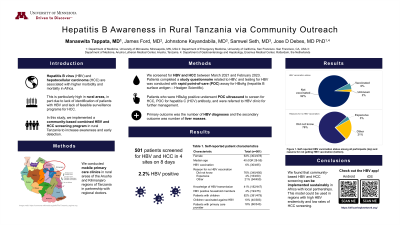Monday Poster Session
Category: Liver
P2379 - Hepatitis B Awareness in Rural Tanzania via Community Outreach
Monday, October 23, 2023
10:30 AM - 4:15 PM PT
Location: Exhibit Hall

Has Audio
- MT
Manaswita Tappata, MD
University of Minnesota
Minneapolis, MN
Presenting Author(s)
Manaswita Tappata, MD1, James Ford, MD2, Johnstone Kayandabila, MD3, Samwel Seth, MD3, Jose Debes, MD, PhD1
1University of Minnesota, Minneapolis, MN; 2University of California, San Francisco, San Francisco, CA; 3Arusha Lutheran Medical Center, Arusha, Arusha, Tanzania
Introduction: Sub-saharan Africa has a high burden of hepatitis B virus (HBV) and hepatocellular carcinoma (HCC), particularly in rural areas, in part due to lack of identification of patients with HBV and lack of feasible surveillance programs for HCC. Here, we discuss community-based combined HBV and HCC screening program in rural Tanzania for early detection and to increase awareness.
Methods: We conducted mobile primary care clinics in rural villages in Tanzania in partnership with regional doctors and public health workers to screen for HBV and HCC between March 2021 and February 2023. Patients who presented to the clinics underwent informed consent and completed a study questionnaire related to HBV. HBV testing was conducted with rapid point-of-care (POC) assay requiring a fingerstick testing for HBsAg (hepatitis B surface antigen). HBsAg positive patients underwent POC ultrasound to screen for HCC, POC assay for hepatitis C (HCV) antibody, and were referred to HBV clinic for further management. Primary outcome was number of HBV diagnoses and secondary outcome was the number of liver masses. Data were analyzed with descriptive statistics.
Results: A total of 501 patients were screened for HBV with rapid antigen testing in four villages, and of these, 63% (n=303) were female with median age of 40 (IQR 28-55). Only 6% (n=30) were vaccinated against HBV, 92% (n=453) were not vaccinated, and 2.4% (n=12) did not know vaccination status. 73% (n=310) of respondents did not know they should get vaccinated against HBV and 3.8% (n=16) reported that vaccination was too expensive. 41% (n=182) knew how HBV was transmitted, and 4.1% (n=18) of patients had at least one household member with HBV. There were 2.4% (n=11) of patients who were positive for HBsAg, and over half were female (54.5% n=6) with a median age of 36 years (IQR 34-43). All patients who tested positive were not vaccinated against HBV and were negative for HCV. 3 patients were tested for hepatitis B e antigen (HBeAg) with all three being positive. On ultrasound, one patient had a mass detected, and one patient had ascites detected.
Discussion: Our study demonstrates that community-based HBV and HCC screening can be implemented sustainably in Africa with local partnerships. This model could be used in regions with high HBV endemicity and low rates of HCC screening.
Disclosures:
Manaswita Tappata, MD1, James Ford, MD2, Johnstone Kayandabila, MD3, Samwel Seth, MD3, Jose Debes, MD, PhD1. P2379 - Hepatitis B Awareness in Rural Tanzania via Community Outreach, ACG 2023 Annual Scientific Meeting Abstracts. Vancouver, BC, Canada: American College of Gastroenterology.
1University of Minnesota, Minneapolis, MN; 2University of California, San Francisco, San Francisco, CA; 3Arusha Lutheran Medical Center, Arusha, Arusha, Tanzania
Introduction: Sub-saharan Africa has a high burden of hepatitis B virus (HBV) and hepatocellular carcinoma (HCC), particularly in rural areas, in part due to lack of identification of patients with HBV and lack of feasible surveillance programs for HCC. Here, we discuss community-based combined HBV and HCC screening program in rural Tanzania for early detection and to increase awareness.
Methods: We conducted mobile primary care clinics in rural villages in Tanzania in partnership with regional doctors and public health workers to screen for HBV and HCC between March 2021 and February 2023. Patients who presented to the clinics underwent informed consent and completed a study questionnaire related to HBV. HBV testing was conducted with rapid point-of-care (POC) assay requiring a fingerstick testing for HBsAg (hepatitis B surface antigen). HBsAg positive patients underwent POC ultrasound to screen for HCC, POC assay for hepatitis C (HCV) antibody, and were referred to HBV clinic for further management. Primary outcome was number of HBV diagnoses and secondary outcome was the number of liver masses. Data were analyzed with descriptive statistics.
Results: A total of 501 patients were screened for HBV with rapid antigen testing in four villages, and of these, 63% (n=303) were female with median age of 40 (IQR 28-55). Only 6% (n=30) were vaccinated against HBV, 92% (n=453) were not vaccinated, and 2.4% (n=12) did not know vaccination status. 73% (n=310) of respondents did not know they should get vaccinated against HBV and 3.8% (n=16) reported that vaccination was too expensive. 41% (n=182) knew how HBV was transmitted, and 4.1% (n=18) of patients had at least one household member with HBV. There were 2.4% (n=11) of patients who were positive for HBsAg, and over half were female (54.5% n=6) with a median age of 36 years (IQR 34-43). All patients who tested positive were not vaccinated against HBV and were negative for HCV. 3 patients were tested for hepatitis B e antigen (HBeAg) with all three being positive. On ultrasound, one patient had a mass detected, and one patient had ascites detected.
Discussion: Our study demonstrates that community-based HBV and HCC screening can be implemented sustainably in Africa with local partnerships. This model could be used in regions with high HBV endemicity and low rates of HCC screening.
Disclosures:
Manaswita Tappata indicated no relevant financial relationships.
James Ford indicated no relevant financial relationships.
Johnstone Kayandabila indicated no relevant financial relationships.
Samwel Seth indicated no relevant financial relationships.
Jose Debes indicated no relevant financial relationships.
Manaswita Tappata, MD1, James Ford, MD2, Johnstone Kayandabila, MD3, Samwel Seth, MD3, Jose Debes, MD, PhD1. P2379 - Hepatitis B Awareness in Rural Tanzania via Community Outreach, ACG 2023 Annual Scientific Meeting Abstracts. Vancouver, BC, Canada: American College of Gastroenterology.
